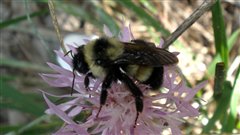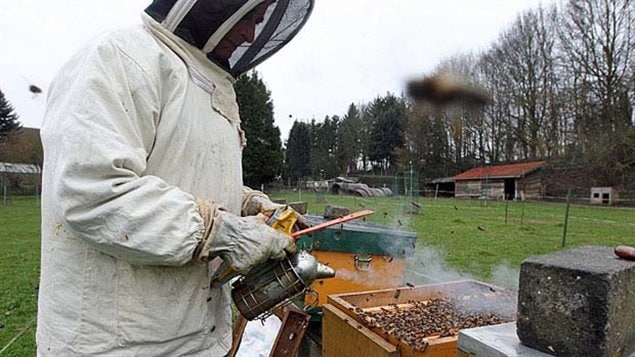The provincial Ministry of Agriculture, Food, and Rural Affairs in Ontario is asking farmers to be extra careful when planting this spring.
Virtually all corn seed is treated with neonicotinoid insecticide, which the ministry says could pose a threat to bees. It says the neonicotinoid dust gets into the air and could be linked to bee deaths.
Last year Health Canada’s Pest Management Regulatory Agency received an unusually high number of bee loss reports from across southern Ontario during the period April-June which coincided with crop planting in corn producing areas.
Residues of nitro-guanidine neonicotinoid insecticides used to treat corn seed were detected in approximately 70 per cent the dead bee samples analyzed by the agency.
York University’s Laurence Packer is an expert in wild bees. He says wild bees actually do most of the pollination of plants. He adds that while it is much harder to estimate losses in the wild bee population, it is clear their numbers are down as well. He says bumblebees, once the third most common type of bee in southern Ontario, are now almost extinct there. He notes however that insecticide is only one part of the problem and that climate change seems to be playing a role as well in terms of wild bee losses.

On Monday, the European Union announced it plans to restrict use of three noenicotinoid pesticides to better protect bees. The announcement came after the EU’s 27 nations failed to agree on a common stand. EU Consumer Commissioner Tonio Borg said the agency will override the deadlock.
Beekeepers in western Europe have also indicated they’ve experienced a major decline in their bee populations.
Environmentalists applauded the decision, while chemical manufacturers said they were disappointed and questioned the scientific evidence for restrictions.
However, a March 2013 study published by British researchers in the journal Nature Communications, found when a bee is exposed to sublethal does of neonicotinoids and a popular organophosphate mite-killing chemical, honeybees experienced brain damage. The bees’ neurons stopped firing correctly, causing “epileptic-type” hyperactivity; the different lobes of the bees’ brain start failing to communicate with each other.
The American Bird Conservancy is also calling for a ban on neonicotinoids. Cynthia Palmer, co-author of a report on the affects of these types of insecticides says its clear that the chemicals have the potential to affect entire food chains
“Even a tiny grain of wheat or canola treated with the oldest neonicotinoid—called imidacloprid—can fatally poison a bird, and as little as 1/10th of a neonicotinoid-coated corn seed per day during egg-laying season is all that is needed to affect reproduction.”
American Bird Conservancy- insecticide and bird deaths
RCI Dr Laurence Packer (York U) on worrisome decline of bees
Nature Communications- scientific study on neocotinoids affect on bees-







For reasons beyond our control, and for an undetermined period of time, our comment section is now closed. However, our social networks remain open to your contributions.